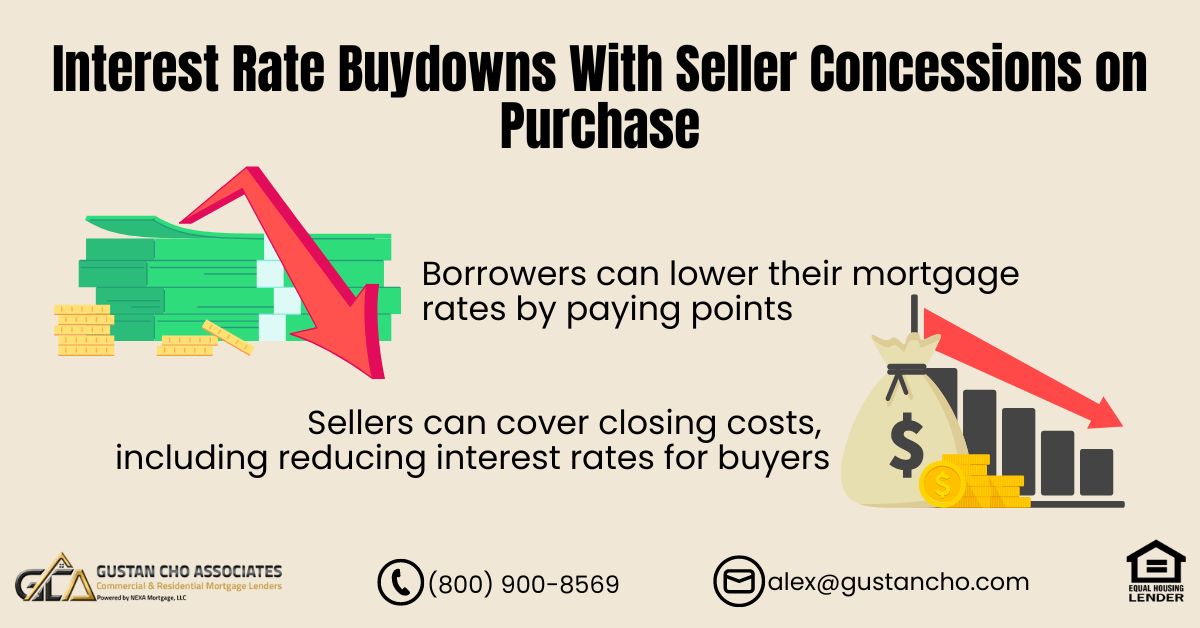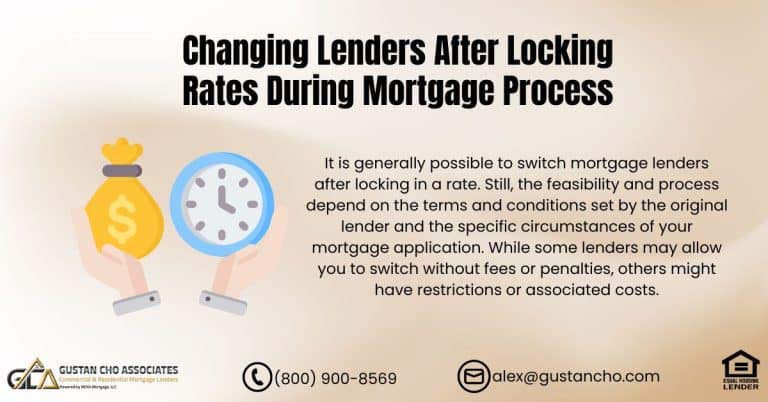This guide covers interest rate buydowns with seller concessions on purchases. Interest Rate Buydowns are when borrowers pay DISCOUNT POINTSto buy down interest rates. Borrowers with great credit and a good mortgage interest rate can often get even lower interest rates by paying points for a lower mortgage interest rate. Mortgage rate buydowns are a great strategy if the homeowner intends to keep the home long-term and not refinance soon.
What Are Interest Rate Buydowns for Mortgage Loans
Borrowers can achieve the highest credit scores by considering several key factors. These include maintaining FICO scores at 740 or above, providing a down payment of 20%, keeping debt-to-income ratios below 40%, and opting for single-family homes. Among property types, single-family homes typically offer the lowest interest rates, followed by townhomes and condominiums.
Borrowers who purchase townhomes, condominiums, and multi-family homes have higher interest rates because they are considered riskier investments.
Borrowers can lower their mortgage rates through buydowns by paying points. Each point represents 1.0% of the loan amount. For instance, if the prevailing market interest rate for a conforming conventional fixed-rate mortgage loan stands at 4.5%, a borrower could secure a 4.25% interest rate by paying 1 point, a 4.0% rate by paying 1.5 points, and a 3.75% rate by paying 2.0 points. This example serves to illustrate a potential scenario.
Speak With Our Loan Officer for Getting Mortgage Loans
Interest Rate Buydowns with Seller Concessions
Seller concessions refer to when a seller of a home agrees to cover the closing costs for the buyer. These concessions can also be utilized by borrowers to decrease their mortgage interest rates. Let’s explore the permitted seller concessions across various types of home purchases. For FHA loans, HUD permits up to 6% in seller concessions.
The Veterans Affairs Administration allows up to 4% for VA loans, while USDA loans enable up to 6% in seller concessions. Fannie Mae and Freddie Mac authorize 3% concessions for owner-occupied properties and 2% for investment homes. Jumbo Mortgages allow a maximum of 3% in seller concessions, while NON-QM Loans can reach up to 6%. Seller concessions can be applied toward covering both closing costs and reducing interest rates.
Seller Concessions For Closing Costs And Buying Points
Seller concessions can only be used for closing costs and no down payment on a home purchase. Here are examples of closing costs on home purchases:
- Title charges
- Recording Fees
- Appraisal Fees
- Pre-Paid, which are escrows for taxes and insurance
- Appraisal fees
- Attorney fees
- Inspection fees
- Homeowners insurance premium
- Mortgage Insurance
- Points
Overages of Seller Concessions
Requesting maximum seller concessions is advisable, but borrowers should be aware that receiving kickbacks from these concessions is not permissible if there are overages. In the case of excess seller concessions, loan officers can utilize these to lower the mortgage rate through buydowns, allowing borrowers to pay points for a reduced interest rate.
If refinancing isn’t immediate, borrowers might consider paying additional points to secure significantly lower mortgage rates. It’s essential to note that homeowners face closing costs each time they refinance their mortgage.
Speak With Our Loan Officer for Getting Mortgage Loans
Cases Where Mortgage Rate Buydowns Are Necessary
At times, rate buydowns become essential. Borrowers surpassing the maximum debt-to-income ratio limits might require reduced mortgage rates to adhere to these caps. This is a common practice among borrowers with high DTIs. Purchasing points to lower interest rates can be considered as a method to decrease borrowers’ debt-to-income ratios, alongside other tactics like reducing balances on credit cards and other debts.
What Are Interest Rate Buydowns
Consider a buydown option if you aim to reduce your monthly mortgage payments and save on interest expenses. A buydown is a mortgage financing technique that allows you to pay a lower interest rate for a certain period, usually at the beginning of the loan term. A buydown can help you qualify for a larger loan amount, afford a more expensive home, or reduce your housing expenses.
This blog will explain a buydown, how it differs from other mortgage discounts, and what benefits and drawbacks it offers home buyers and sellers.
How Do Interest Rate Buydowns Work
A buydown refers to a mortgage discount where an initial extra fee is paid to decrease the loan’s interest rate for a set duration. This fee can be covered by the borrower, seller, or a third party like an employer or builder. Usually, the fee is a percentage of the loan amount or is measured in points, where each point equals 1% of the loan amount.
There are primarily two kinds of buydowns: permanent and temporary. A permanent buydown sustains a reduced interest rate for the entirety of the loan. Meanwhile, a temporary buydown lowers the interest rate for a limited period, typically spanning one to three years. Following this period, the interest rate either returns to the original rate or adjusts based on the loan terms.
An illustration of a short-term buydown is the 3-2-1 buydown. In this scenario, the interest rate decreases by three percentage points in the initial year, followed by a two-point reduction in the second year and a one-point reduction in the third year. For instance, if the prevailing market interest rate stands at 5%, a 3-2-1 buydown would adjust it to 2% in the first year, 3% in the second year, and 4% in the third year. Beyond the third year, the interest rate would revert to 5% and remain at that level.
Speak With Our Loan Officer for Getting Mortgage Loans
Interest Rate Buydowns With Discount Points
A buydown sets up an escrow account funded by the additional fee paid by the borrower, seller, or a third party. Throughout the buydown period, this escrow account supports the borrower’s monthly payments. While the lender receives the complete payment each month, a portion originates from the escrow account and the remainder from the borrower. Dale Elenteny, a senior loan officer with Gustan Cho Associates, explains how interest rate buydowns work in mortgage loans:
A common example of a temporary buydown is a 2-1 buydown. In this case, the interest rate is reduced by two percentage points in the first year and by one percentage point in the second year. For example, if the market interest rate is 5%, a 2-1 buydown would lower it to 3% in the first year and 4% in the second year. The interest rate would be 5% in the third year and beyond.
For example, suppose you take out a $200,000 loan with a 5% interest rate and a 30-year term. Your monthly payment would be $1,074. If you get a 2-1 buydown that lowers your interest rate to 3% in the first year and 4% in the second year, your monthly payment would be $843 in the first year and $955 in the second year. However, your lender would still receive $1,074 each month.
The difference between your and your lender’s payments would come from the escrow account. You would need to pay an extra fee to fund the escrow account. The amount of this fee depends on several factors, such as:
- The size of your loan
- The market interest rate
- The amount of interest rate reduction
- The duration of the buydown period
- The discount rate used by your lender
The discount rate is the interest rate that your lender uses to calculate how much money to receive upfront to agree to lower your interest rate for a certain period. The higher the discount rate, the higher your fee will be.
What Are the Benefits and Drawbacks of a Buydown?
A buydown can offer both home buyers and sellers several benefits and drawbacks. Here are some of the benefits. For home buyers, a buydown can help them. Save money on interest over the life of the loan. Lower their monthly payments and improve their cash flow.
Qualify for a larger loan amount and afford a more expensive home. Time their mortgage payments with their income growth or inflation expectation. Take advantage of tax deductions on the extra fee paid for the buydown.
Attract more buyers and increase the demand for their property. Sell their property faster and at a higher price. Offset the buydown cost by raising the property’s sale price. Transfer the risk of interest rate fluctuations to the buyer.
Speak With Our Loan Officer for Getting Mortgage Loans
Drawbacks of Interest Rate Buydowns
For home buyers, opting for a buydown might lead to certain drawbacks. These could include a potentially higher purchase price for the property if the seller incorporates the buydown into the deal. There’s also the risk of paying an upfront fee that might not be regained if they decide to sell or refinance the property before the buydown period ends, which could result in a payment shock once the interest rate increases post the buydown period.
Moreover, buyers might accumulate less equity in the property due to reduced principal payments during the buydown period. Additionally, the upfront fee may not be recovered by increasing the property’s sale price, leading to a narrower profit margin upon sale and potentially limiting negotiating flexibility on other terms within the sale contract.
Summary of Interest Rate Buydowns in the Mortgage Process
A buydown, a method in mortgage financing, allows for a reduced interest rate, typically at the loan’s start. This approach aids in saving on interest, decreasing monthly payments, enabling qualification for a larger loan, or affording a more expensive property. When seeking a buydown, it’s crucial to compare lenders and their terms, considering your financial status, long-term plans for staying in your home, and overall objectives.
Opting for a buydown proves beneficial if you can manage the initial extra fee, anticipate income growth, or aim to leverage favorable interest rates.
If you have any questions on interest rate buydowns, please contact us at Gustan Cho Associates at 800-900-8569. Text us for a faster response. Or email us at alex@gustancho.com. The team at Gustan Cho Associates is available 7 days a week, on evenings, weekends, and holidays.
Speak With Our Loan Officer for Getting Mortgage Loans
FAQ – Interest Rate Buydowns with Seller Concessions on Mortgage Purchases
What are interest rate buydowns for mortgage loans? Interest rate buydowns involve borrowers paying discount points to lower mortgage interest rates. Borrowers with excellent credit can secure even lower rates by purchasing points, typically 1% of the loan amount per point.
What is a buydown, and how does it differ from other mortgage discounts? A buydown is a mortgage financing technique allowing a lower interest rate for a set period. It differs from other discounts by involving an initial extra fee paid by the borrower, seller, or a third party.
What are the benefits of interest rate buydowns? Benefits include saving on interest over the loan term, lower monthly payments, qualification for a larger loan, and the ability to afford a more expensive home. It also allows timing mortgage payments with income growth and taking advantage of tax deductions.
What are the drawbacks of interest rate buydowns? Drawbacks may include a potentially higher property purchase price, the risk of an unrecoverable upfront fee if selling or refinancing before the buydown period ends, and accumulating less equity due to reduced principal payments during the buydown period.
How can borrowers achieve the highest credit scores for interest rate buydowns? Maintaining a FICO score of 740 or above, providing a 20% down payment, keeping debt-to-income ratios below 40%, and opting for single-family homes contribute to achieving the highest credit scores for better interest rates.
How do seller concessions impact interest rate buydowns? Seller concessions, where sellers cover closing costs, can be utilized to decrease mortgage interest rates. The permitted concessions vary across loan types, such as 6% for FHA loans, 4% for VA loans, and 3% for Fannie Mae and Freddie Mac loans.
Can seller concessions be used for down payment? No, seller concessions can only be used for covering closing costs and not for the down payment on a home purchase.
In what cases are mortgage rate buydowns necessary? Mortgage rate buydowns may be necessary when borrowers exceed maximum debt-to-income ratio limits, requiring reduced rates to comply with these limits. This is common among borrowers with high DTIs.
How do interest rate buydowns work with discount points? A buydown sets up an escrow account funded by the additional fee paid. During the buydown period, this escrow account supports monthly payments. The fee depends on factors like the loan size, market interest rate, amount of rate reduction, duration of the buydown, and the lender’s discount rate.
How can borrowers benefit from interest rate buydowns with seller concessions? Borrowers can benefit by securing lower interest rates, covering closing costs, and potentially increasing property demand. However, they should carefully consider the upfront fee and its impact on the overall cost and financial goals.
This blog on Interest Rate Buydowns With Seller Concessions on Purchase was updated on January 11th, 2024.










